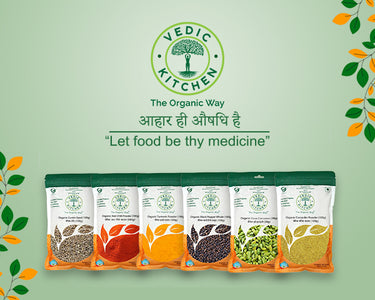As we navigate the world of health and wellness, there’s a growing fascination with ancient foods and practices that have sustained generations before us. Among these treasures are Vedic seeds, revered in traditional Indian culture for their remarkable nutritional and healing properties. Rooted in Vedic practices, these seeds symbolize both heritage and health, offering a natural approach to nutrition that aligns with holistic living. But what exactly are Vedic seeds, and why are they worth integrating into our diets today? Let’s dive into their benefits and understand why they have become a staple in the quest for a balanced, nutrient-rich lifestyle.
What Are Vedic Seeds?
Vedic seeds refer to a collection of seeds used in ancient Vedic culture, often known for their resilience, nutritional richness, and medicinal value. These seeds were cultivated and consumed long before modern agriculture and food processing practices. The term “Vedic” derives from the Vedic period (around 1500–500 BCE), a time when ancient texts like the Vedas were written, documenting the wisdom of Ayurveda, agriculture, and dietary practices that promote health and longevity.
Some popular examples of Vedic seeds include sesame, flax, amaranth, and hemp seeds. Each of these seeds carries a unique profile of vitamins, minerals, antioxidants, and essential fatty acids, making them exceptional sources of natural nourishment. Their versatility allows them to be incorporated into various recipes, from breads and snacks to smoothies and desserts.
1. Rich in Essential Nutrients
One of the primary reasons Vedic seeds are so beneficial is their exceptional nutrient density. These seeds are packed with essential vitamins and minerals that are often lacking in modern diets. For instance:
- Sesame seeds are rich in calcium, iron, magnesium, and zinc, making them excellent for bone health, immune function, and cellular metabolism.
- Flax seeds contain high levels of omega-3 fatty acids, which are crucial for brain health, reducing inflammation, and supporting heart function.
- Amaranth seeds provide a complete protein profile, including all nine essential amino acids, along with a wealth of iron, calcium, and magnesium, ideal for those on plant-based diets.
- Hemp seeds are not only high in protein but also contain a perfect balance of omega-3 and omega-6 fatty acids, promoting cardiovascular health and skin vitality.
Incorporating these nutrient-dense seeds into daily meals is a straightforward way to improve overall nutrient intake without relying on processed supplements.
2. Abundant Source of Antioxidants
Vedic seeds are known for their high antioxidant content, which helps protect the body from oxidative stress and inflammation, both of which contribute to chronic diseases such as cancer, diabetes, and cardiovascular issues. The antioxidants in these seeds are diverse and potent, including lignans in sesame and flax seeds, which have shown promising effects in reducing cancer risks and hormone-related imbalances.
Amaranth seeds, for example, contain a potent antioxidant known as squalene, which supports cellular repair and protects against environmental toxins. Hemp seeds, on the other hand, are rich in tocopherols, a type of Vitamin E compound that supports skin health, improves cellular immunity, and may even slow down aging processes.
3. Support Digestive Health
Modern lifestyles and diets often lead to digestive issues, from bloating and indigestion to irritable bowel syndrome (IBS). Vedic seeds offer a solution to these problems with their high fiber content, especially in seeds like flax and amaranth. These seeds promote digestive regularity, help maintain a healthy gut microbiome, and can ease symptoms of digestive discomfort.
For example:
- Flax seeds are particularly rich in mucilage, a gel-forming fiber that aids in slowing digestion, which can stabilize blood sugar and improve nutrient absorption.
- Amaranth seeds contain both soluble and insoluble fiber, which helps in adding bulk to stool and promotes regularity.
- Sesame seeds have a mild laxative effect, making them effective in relieving constipation.
Adding Vedic seeds to your diet can be an easy and natural way to improve digestion, enhance gut health, and prevent gastrointestinal issues over time.
4. Great for Heart Health
The heart-health benefits of Vedic seeds are well-documented. Seeds like flax and hemp contain heart-healthy fats, fiber, and compounds that help reduce cholesterol and maintain blood pressure levels within a healthy range. For example, the omega-3 fatty acids in flax seeds and the omega-6 fatty acids in hemp seeds work synergistically to lower bad cholesterol (LDL) and raise good cholesterol (HDL), supporting cardiovascular function.
Sesame seeds are also beneficial for heart health. Their high magnesium content supports the relaxation of blood vessels, while their lignans and antioxidants prevent the buildup of arterial plaque and support circulatory health. Regular consumption of these seeds is an easy way to support heart health, reduce the risk of heart disease, and maintain healthy blood pressure levels.
5. Versatile and Easy to Use
One of the best aspects of Vedic seeds is their versatility. They can be incorporated into various dishes, enhancing both flavor and nutrition without overpowering the dish. Here are a few ideas on how to include them in your diet:
- Sesame seeds: Sprinkle on salads, toast them for a nutty flavor in stir-fries, or blend them into tahini.
- Flax seeds: Add to smoothies, bake them into bread, or mix with water to create a vegan egg substitute for baking.
- Amaranth seeds: Use as a rice substitute, add to soups, or pop them like popcorn for a crunchy snack.
- Hemp seeds: Sprinkle over oatmeal, mix into yogurt, or add to homemade energy bars.
6. Environmentally Friendly and Sustainable
Lastly, Vedic seeds are not only beneficial for personal health but are also an eco-friendly food choice. These seeds often require fewer resources to grow compared to many commercial crops. Additionally, they support biodiversity and soil health, as they are typically less reliant on chemical fertilizers and pesticides. Choosing these seeds can contribute to a more sustainable food system, as well as a reduced environmental footprint.
Conclusion
In a world where convenience and processed foods often overshadow nutritional value, Vedic seeds offer a return to nature’s wisdom. With benefits ranging from heart health and improved digestion to antioxidant support and balanced nutrition, these ancient seeds are a powerful addition to any diet. By incorporating them into daily meals, we can rediscover ancient nutrition and cultivate a wellness-centered lifestyle grounded in natural, sustainable choices.



